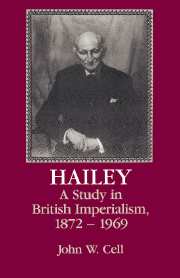Book contents
- Frontmatter
- Contents
- List of abbreviations
- Glossary of foreign words
- Preface
- 1 Early life
- 2 Colonization officer, 1901–1906
- 3 From Sargodha to Delhi, 1907–1912
- 4 Chief commissioner of Delhi, 1912–1918
- 5 A report on the Punjab
- 6 Finance member, 1919–1922
- 7 Home member, 1922–1924
- 8 Governor of the Punjab: the Sikhs, 1924–1925
- 9 Governor of the Punjab: the communal problem, 1924–1926
- 10 Governor of the Punjab: the communal problem, 1927–1928
- 11 Governor of the United Provinces, 1928–1930
- 12 Governor of the United Provinces: civil disobedience and Round Table Conference, 1930–1931
- 13 Governor of the United Provinces: 1931, year of crisis
- 14 Governor of the United Provinces: winding down, 1932–1934
- 15 Surveyor of Africa, 1935–1939
- 16 Two missions to Africa, 1939–1940
- 17 A report and a vision, 1941–1942
- 18 Adviser and propagandist, 1942–1945
- 19 Indian partition and the onset of African decolonization, 1945–1949
- 20 Defender of the faith, 1949–1969
- Bibliography
- Index
16 - Two missions to Africa, 1939–1940
Published online by Cambridge University Press: 12 October 2009
- Frontmatter
- Contents
- List of abbreviations
- Glossary of foreign words
- Preface
- 1 Early life
- 2 Colonization officer, 1901–1906
- 3 From Sargodha to Delhi, 1907–1912
- 4 Chief commissioner of Delhi, 1912–1918
- 5 A report on the Punjab
- 6 Finance member, 1919–1922
- 7 Home member, 1922–1924
- 8 Governor of the Punjab: the Sikhs, 1924–1925
- 9 Governor of the Punjab: the communal problem, 1924–1926
- 10 Governor of the Punjab: the communal problem, 1927–1928
- 11 Governor of the United Provinces, 1928–1930
- 12 Governor of the United Provinces: civil disobedience and Round Table Conference, 1930–1931
- 13 Governor of the United Provinces: 1931, year of crisis
- 14 Governor of the United Provinces: winding down, 1932–1934
- 15 Surveyor of Africa, 1935–1939
- 16 Two missions to Africa, 1939–1940
- 17 A report and a vision, 1941–1942
- 18 Adviser and propagandist, 1942–1945
- 19 Indian partition and the onset of African decolonization, 1945–1949
- 20 Defender of the faith, 1949–1969
- Bibliography
- Index
Summary
In October 1939 Lord Hailey joined a distinguished group of officials and scholars at London's Carlton Hotel. The subject was Africa and World War II. A generation earlier he himself had seen Indian nationalism transformed by global conflict. In Africa too World War I had been a powerful catalyst, increasing the range and pace of colonialism while simultaneously stimulating the growth of African political consciousness. This time the impact would be still more powerful. The colonial secretary, Malcolm MacDonald, identified three main problems. First, hoping to determine where indirect rule was heading and prevent unwise wartime concessions to white settlers in East and Central Africa, he intended sending someone out to investigate. Second, in order to cut costs as well as to encourage their political advance, Africans should be employed at all levels throughout the government services. Third was the land question, although the local variations were so wide that a series of regional inquiries would probably be required to deal with it.
White settlers were the most urgent problem, Lord Lugard declared. For several years now, especially in Kenya, they had been having things far too much their own way; if the British continued along the same lines people would doubt the sincerity of their trusteeship. Since parliamentary institutions were fundamentally unsuited to Africans, he felt, indirect rule ought to aim at gradually assimilating small units into central councils. Educated Africans were pressing hard for unofficial majorities in legislative councils, Hailey pointed out, leaving colonial governments dangerously exposed.
- Type
- Chapter
- Information
- HaileyA Study in British Imperialism, 1872–1969, pp. 241 - 253Publisher: Cambridge University PressPrint publication year: 1992
- 1
- Cited by



